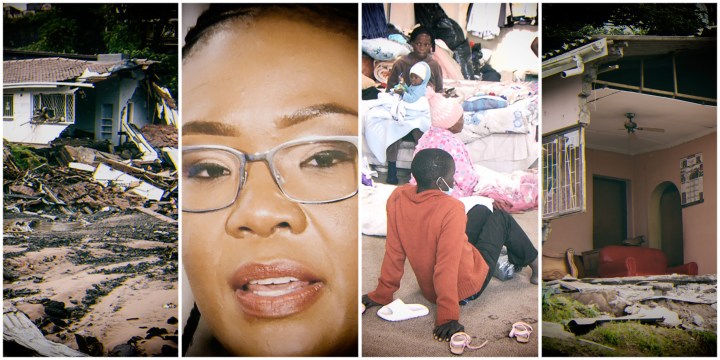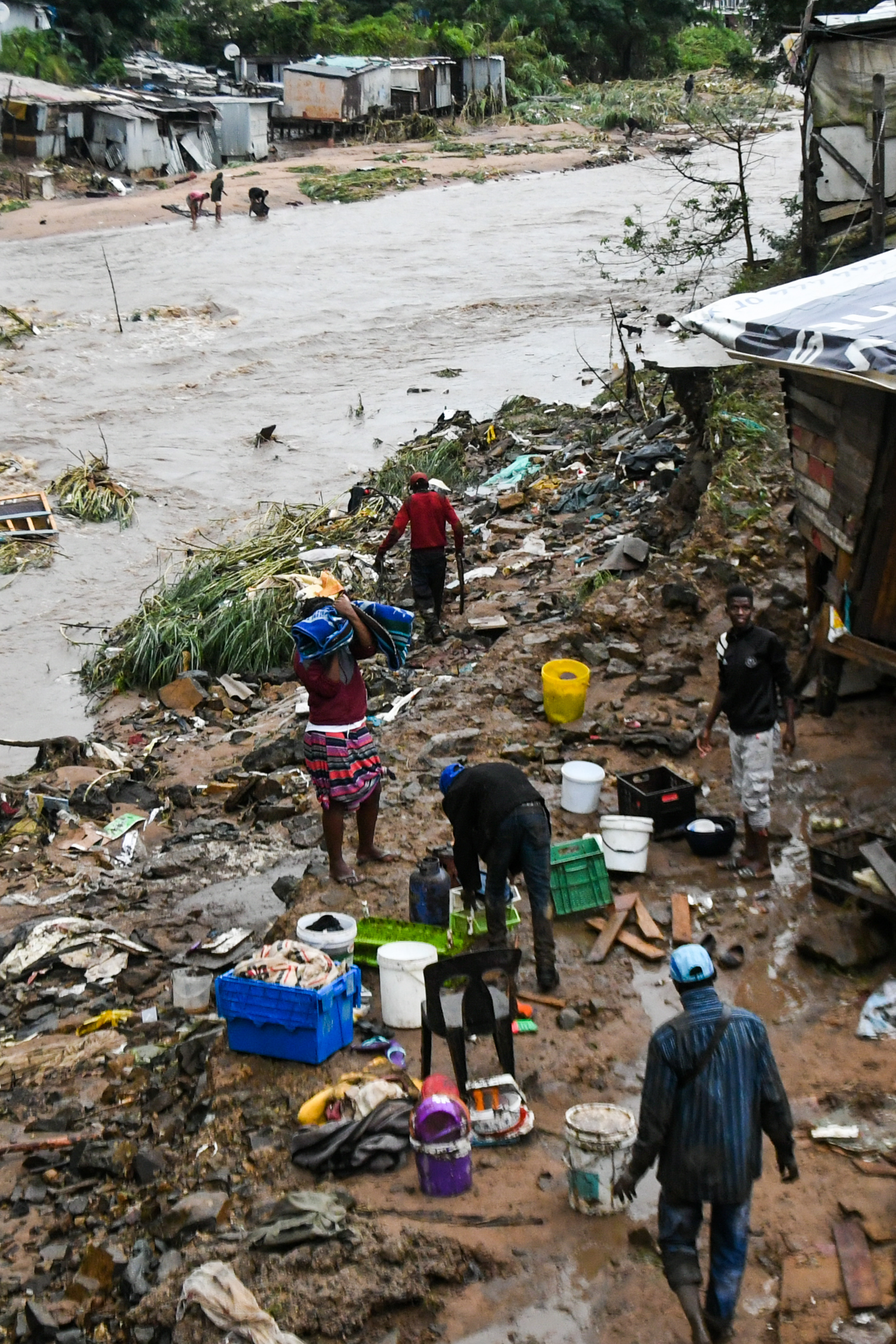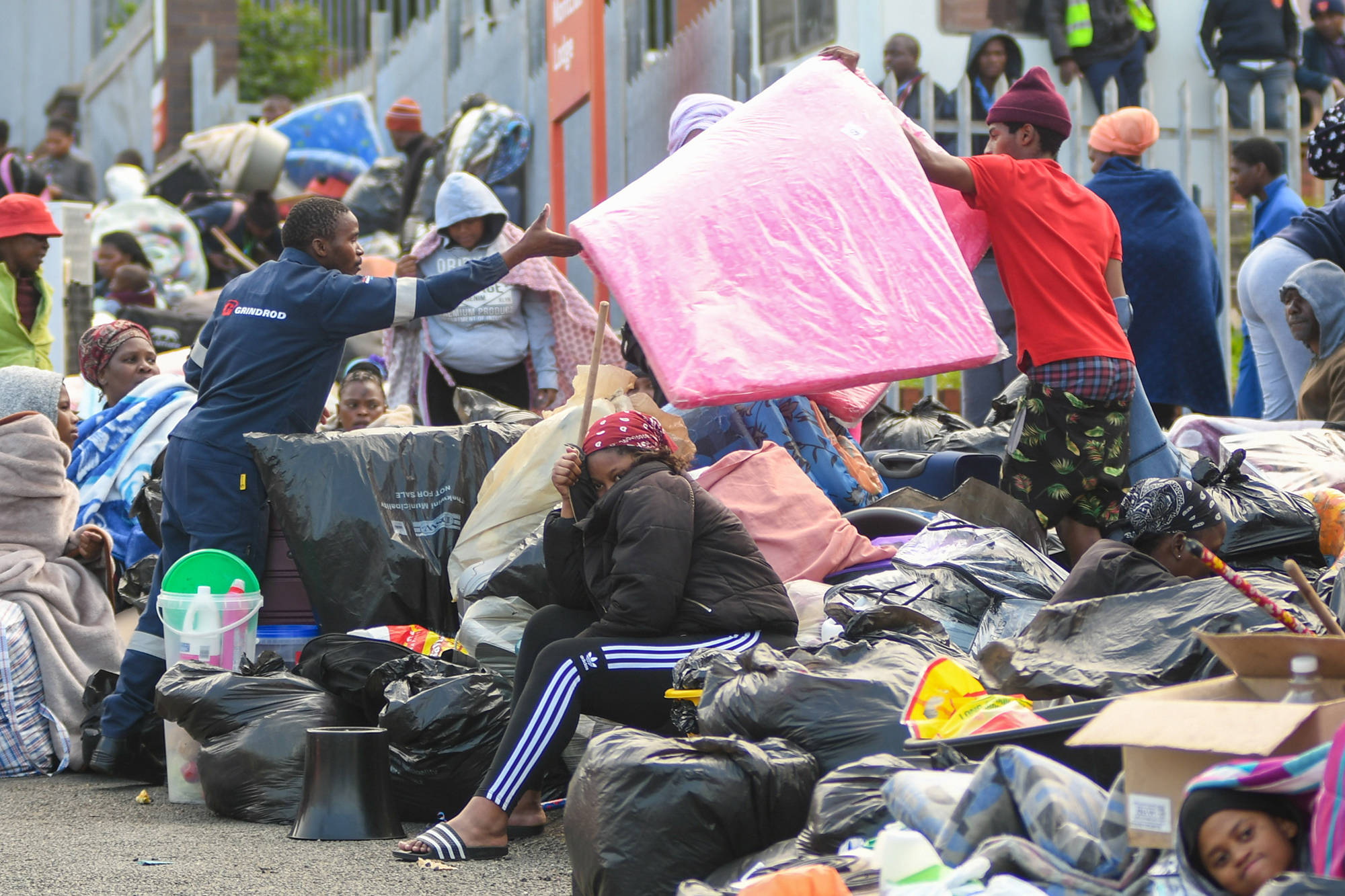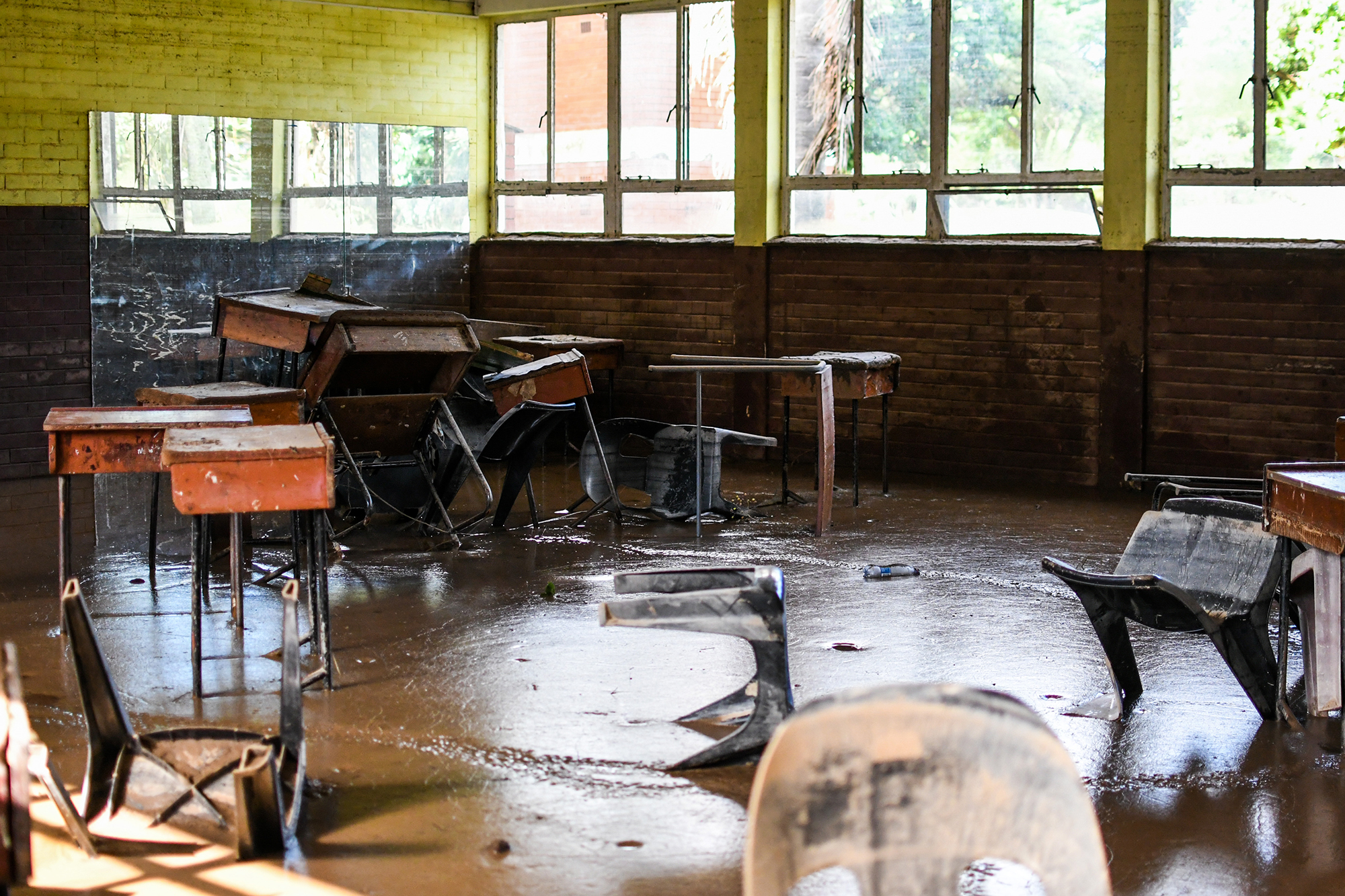DISASTER AID
Auditor-General report: Only 6% of emergency relief funds for KZN flood victims spent

The Auditor-General on Wednesday released her first report on the use of relief funds for flood-affected communities in KwaZulu-Natal and the Eastern Cape. It painted a grim picture of the government’s response to the disaster. Daily Maverick unpacks the report’s findings.
‘Any disaster response requires urgent and well-coordinated action by national, provincial and local government and by the contractors they appoint. An emergency does not negate the need for accountability for the funds used, the quality of the delivery, or the value derived from the money spent,” said Auditor-General (AG) Tsakani Maluleke on Wednesday.
Releasing her office’s first audit report on the use of public funds for flood-affected communities in KwaZulu-Natal and the Eastern Cape — before Parliament’s joint ad hoc committee on flood disaster relief and recovery — Maluleke stressed that the government’s overall response to the disaster had been “far too slow”.
‘Far too slow’ — AG slams government’s epic failure to respond to floods in KZN and Eastern Cape
The audit began in May 2022, and the AG’s first report includes the outcomes of the audit until 15 July 2022, on the following key initiatives:
- Provision of mobile classrooms and kitchens to severely damaged schools in KZN.
- Provision of temporary residential units for KZN residents who lost their homes in the floods.
- Water tankering services in eThekwini Metro where damage to water infrastructure affected water supply.
- Social relief efforts in KZN and the Eastern Cape; and
- Repairs to government properties.
The total budget allocated by national, provincial and local government to provide relief to affected communities through these initiatives, according to the report, was almost R2-billion.
Of this, only R125-million — 6% — had been spent as of 31 July this year.

An informal settlement between the M19 and Quarry Road on 12 April 2022 in Durban. (Photo: Gallo Images / Darren Stewart)
With the exception of the social relief initiative, the emergency measures relating to mobile units, temporary residential units, water tankering services and repairs to government properties had not been completed by 31 July, said the report.
Inadequate water tankering services
The floods in KZN left many communities without access to water, after damage to key infrastructure. This meant the affected communities were forced to rely on non-profit relief efforts and municipal water tankers — the latter being an effort rolled out by eThekwini Metro, with the provincial department of cooperative governance and traditional affairs (CoGTA), and the national department of water and sanitation.
Flood-ravaged KZN communities turn to NGOs after a fortnight without water supply
According to the report, 198 water tankers were secured to ensure that water services were provided to eThekwini communities in need. The AG’s team audited 30 of these tankers, including their procurement, the availability of the vehicles and their delivery of services.
The AG found that “eThekwini Metro did not prepare a comprehensive needs assessment to ensure the effective planning and delivery of water to all affected areas”, which resulted in water tankers failing to meet the needs of affected communities.
The fleet management of water tankers was inadequate, said Maluleke.

Illustrative image | Sources: Residents collect clean water from a broken pipe sticking out of a collapsed embankment in Durban, 14 April 2022. (Photo: Shiraaz Mohamed) | Flood victims on 8 August 2022 in Durban, South Africa. (Photo: Gallo Images / Darren Stewart) | Gallo Images / Sowetan / Thulani Mbele | Gallo Images / OJ Koloti)
The AG’s office found that only 62% of the water tankers belonging to eThekwini Metro were available for use — 38% were in a state of disrepair or in for maintenance (31%), or could not be tracked and identified (7%).
“That is a fleet management discipline that needs to be strengthened so that the tankers you have invested in can be readily available when needed,” she said.
Additionally, the AG found that in some instances, because of procurement disparities, the same service provider charged the metro less than it had charged the provincial CoGTA. This could have been avoided with better intergovernmental coordination, Maluleke concluded.
“The water tankers themselves were also not monitored effectively. Municipal and hired water tankers operated significantly fewer hours than their required eight- and nine-hour shifts, respectively,” she said.
Visit Daily Maverick’s home page for more news, analysis and investigations
Another key concern arose during site visits between 13 and 27 May, when the AG’s team found that 83% of communities in the metro indicated that they had not received water for at least one day, and 57% for more than three days.
“An old-age home in Tongaat, with 75 residents, did not have water for 45 days from 11 April to 25 May.
“In Amahlongwa, in iLembe District Municipality, residents did not receive water for three consecutive days and obtained water from the dam, river and even from rainwater flowing down the street,” said Maluleke.
The delays in the supply of water to affected communities, the AG said, had caused some residents to resort to using unsafe water for their basic needs.
Durban mother dead, scores sick with diarrhoea as polluted tap water confirmed
While Maluleke commended the metro for accepting her findings and making commitments to address them, she expressed concern that during her Covid real-time audit, her office had reported similar issues over the implementation of the initiative relating to the emergency supply of water to communities and schools.
Temporary housing delays
According to the provincial department of human settlements’ own assessment, 4,983 houses in KZN had been destroyed in the floods. In the aftermath, more than 8,400 people were reportedly being housed in community halls, religious facilities and other temporary structures within communities.
It is evident, according to Maluleke, that the provincial department did not timeously assess and approve displaced households as recipients of temporary residential units (TRUs), which caused delays in the construction of the units.
“There was a plan to put quite a significant number of TRUs in the ground by the end of July. That plan was not met. That target that was set by the department was not met,” said Maluleke.
As of 10 June, only 1,197 of the 4,983 displaced households had been assessed. Additionally, by 31 July, the department had planned to construct 1,810 units, but only 736 TRUs had been completed.

MontClair Lodge, Durban after the floods. Flood victims were living at the lodge after the KZN floods which left a trail of destruction and hundreds dead. (Photo: Gallo Images / Darren Stewart)
Maluleke said that when her team inspected some TRUs, the building specifications — supposed to be standardised — had not been complied with.
“Of the 30 that we inspected, all of them had non-compliances with minimum specifications” and 43% of units had no internal doors, 97% no roof insulation and 20% had been constructed on unsuitable land.
While the government had a “well-intentioned initiative” involving great cost, the benefit did not reach the intended beneficiaries in the way it was designed, the report found.
“The slow progress and validation of displaced households negatively affects the quality of life of those who have lost their homes during the floods, as they remain in mass-relief shelters. They are also required to commute greater distances to work and school at an increased cost, adding to the burdens of an already high cost of living and unemployment,” said Maluleke.
Daily Maverick reported that the province had a temporary housing backlog, with more than 2,000 people displaced during the April 2019 floods still without housing as of September 2021.
More than two months later, destitute Durban deluge victims still wait for promised housing
Restoration of schools
The floods damaged 356 schools in KZN, with the cost of repairing the damages standing at R235-million. Some schools were so severely damaged that mobile units, including classrooms and kitchens, needed to be provided as an interim measure.

A muddy classroom at a flood-affected school in Durban on 19 April 2022. (Photo: Gallo Images / Darren Stewart)
According to the AG, although the provincial education department had a “quick turnaround time” in preparing the needs assessment for the provision of school mobile units, some of the temporary solutions failed to address the needs.
“The monitoring of what was ultimately delivered had weaknesses which had a direct impact of diminishing the benefit that could’ve accrued to people who needed access to mobile classrooms,” said Maluleke.
Social relief efforts in KZN and the Eastern Cape
In KwaZulu-Natal and the Eastern Cape, the disaster affected 117,708 and 6,118 people respectively, according to the report.
In the notes specific to the South African Social Security Agency (Sassa), which administers the social relief budget on behalf of the national department of social development, the AG stated that as of 31 July, Sassa had provided social relief to flood victims in the form of about 99,500 hot meals and 10,894 food vouchers for groceries in KwaZulu-Natal.
Sassa also indicated that 2,637 items of humanitarian goods were delivered, 4,159 cash distributions were paid directly into bank accounts, and 816 school uniforms were provided in KwaZulu-Natal and the Eastern Cape.
The AG said that her office had not identified any material findings or risks in the provision of social relief based on the work done to date.
“It is encouraging that management responded to our audit findings and recommendations from the Covid-19 real-time audits by updating policies and procedures to improve the control environment. They also improved the distribution of relief by providing food vouchers instead of food parcels to eliminate issues of quality and quantity,” said Maluleke.
Repairs to government properties
The AG’s office audited the procurement processes followed by the Property Management Trading Entity (PMTE) to appoint 31 contractors to perform repairs valued at R10.8-million.
“This is the area where we found the most concerning procurement irregularities, and this had a direct impact on delaying the delivery on these projects,” said Maluleke.
The procurement process raised red flags “where some of the appointed contractors had conflicts in terms of being either employees or spouses of employees of the State”.
“We also found that as part of supply chain management processes, there were instances where one director would own three companies and still be awarded contracts separately.”
Weak procurement management controls meant that these issues were not identified and addressed, said the AG. DM


















 Become an Insider
Become an Insider
A shambolic and totally inadequate response to the floods and the victims in KZN and EC! Is anyone surprised? Will anyone be fired? Probably not to both. The utter lack of empathy to one’s fellow citizens from ‘public servants’ never ceases to shock. Give the money to Gift of the Givers! Second staff from them to train people on how to get things done.
Yet more proof (if any were needed) that our government is totally uncaring and incompetent. Cadre deployment is the root cause.
They are probably, as we speak, setting up front companies so that they can benefit handsomely as always from the proceeds of their electorate’s misery.
In the meantime people are dying.
But watch.. the people will elect them again! Beyond comprehension!